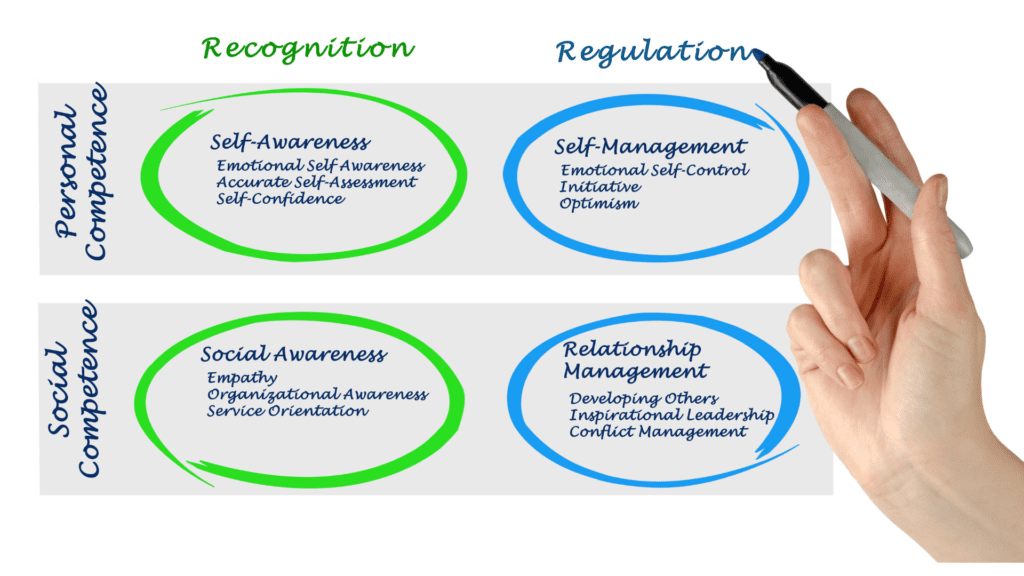Decoding the Emotional Enigma
Emotions are the vibrant threads that weave through the tapestry of human experience. They color our perceptions, influence our decisions, and shape our interactions with the world around us. But what exactly are these feelings, and why do they hold such power over us?
At their core, emotions are complex psychological and physiological states that arise in response to various stimuli. They involve a symphony of changes in our thoughts, feelings, and bodily sensations, serving several crucial functions:
- Survival: Emotions like fear and anger act as our internal alarm system, helping us respond swiftly to potential threats.
- Decision-making: Our emotional responses often serve as intuitive guides, steering our choices and judgments.
- Social communication: Emotions facilitate non-verbal communication, fostering social bonds and understanding.
- Motivation: Positive feelings can propel us towards beneficial behaviors and goals.
The Neural Orchestra of Emotions
Our emotional experiences are orchestrated by an intricate network within our brains, particularly the limbic system. This neural ensemble, featuring key players like the amygdala, hippocampus, and hypothalamus, takes center stage in processing and regulating our feelings.
The amygdala, often dubbed the brain’s emotional conductor, plays a crucial role in processing fear and other intense emotions. When we encounter a potentially threatening situation, the amygdala sends rapid signals to the hypothalamus, triggering our fight-or-flight response.Recent research has uncovered fascinating connections between emotion-processing areas and decision-making centers. MIT neuroscientists have discovered neural pathways, called striosome-dendron bouquets, that link areas controlling emotion, decision-making, and movement. These connections may explain how our feelings influence our choices and actions.For a deeper dive into the limbic system, check out our article on understanding the limbic system.

The Emotional Control Conundrum
Not all emotions are created equal when it comes to control. Some, like intense fear or anger, can be particularly challenging to manage. This difficulty stems from the way our brain processes different types of emotional stimuli:
- Intensity: Strong feelings activate the amygdala more intensely, making them harder to override with rational thought.
- Speed: The emotional processing pathway is faster than our conscious, rational thinking, making quick emotional reactions difficult to prevent.
- Evolutionary importance: Emotions tied to survival (like fear) are hardwired to be more powerful and immediate.
5 Incredible Ways to Gain Emotional Control
Now that we’ve set the stage with our understanding of emotions and their neural underpinnings, let’s explore five neuroscience-backed strategies for gaining better emotional control:
1. Cognitive Reappraisal: Rewriting Your Emotional Script
Cognitive reappraisal involves consciously changing how we interpret emotional situations. This technique engages the prefrontal cortex, which can help regulate the amygdala’s activity.How to practice:
- When faced with a challenging situation, pause and consider alternative perspectives.
- Ask yourself: “Is there another way to look at this?”
- Try to find positive aspects or learning opportunities in difficult experiences.
Learn more about cognitive reappraisal and emotional control in this research article.
2. Neural Wiring: Strengthening Emotional Control Pathways
Our brains are remarkably plastic, capable of forming new neural connections throughout our lives. By consistently practicing emotional control techniques, we can strengthen the neural pathways that support better regulation.How to practice:
- Engage in regular emotional control exercises, such as deep breathing or progressive muscle relaxation.
- Practice identifying and labeling your emotions accurately.
- Consistently apply cognitive reappraisal in various situations.
For more on how neuroplasticity affects emotional control, read our blog post on neuroplasticity and emotional control.
3. Emotional Labeling: Naming to Tame
Putting words to our emotions can help reduce their intensity. This process activates the prefrontal cortex and can diminish amygdala activity.How to practice:
- When you experience a strong emotion, try to name it specifically.
- Use a wide range of emotional vocabulary to accurately describe your feelings.
- Keep an emotion journal to track and label your emotional experiences.
4. Interoceptive Awareness: Tuning into Your Emotional Body
Interoception refers to our ability to sense internal bodily states. Improving this awareness can enhance emotional regulation by helping us recognize and respond to emotional cues earlier.How to practice:
- Regularly check in with your body throughout the day.
- Notice physical sensations associated with different emotions.
- Practice body scan exercises to improve your interoceptive awareness.
For more information on interoception and emotional awareness, see this research article.
5. Sleep Hygiene: Recharging Your Emotional Battery
Adequate sleep is crucial for emotional regulation. Sleep deprivation can lead to increased amygdala reactivity and decreased prefrontal cortex function.How to practice:
- Establish a consistent sleep schedule.
- Create a relaxing bedtime routine.
- Avoid screens and stimulating activities before bed.
Discover more about the importance of sleep for mental health in our blog post on the importance of sleep for mental health.

The Neuroscience of Emotional Intelligence
Developing these emotional control strategies contributes to overall emotional intelligence. Emotional intelligence encompasses four key areas:
- Self-awareness
- Self-management
- Social awareness
- Relationship management
By improving our emotional control, we enhance our ability to navigate social situations, make better decisions, and lead more fulfilling lives.
Neuroplasticity: The Key to Emotional Growth
The brain’s ability to change and adapt, known as neuroplasticity, means that we can continually improve our emotional intelligence and control throughout our lives. Consistent practice of the strategies outlined above can lead to lasting changes in our brain’s structure and function, making emotional regulation easier over time.Recent studies have shown that the neural circuits controlling feeding and emotional behaviors are intricately connected. This highlights the complex interplay between our emotions and other fundamental biological processes, further emphasizing the importance of emotional control in overall well-being.For more insights into techniques for better emotional regulation, check out our blog post on techniques for better emotional regulation.
Embracing Emotional Complexity
While gaining control over our emotions is valuable, it’s important to remember that emotions themselves are not the enemy. They provide valuable information about our experiences and needs. The goal is not to suppress emotions but to respond to them in healthy, adaptive ways.
As we grow from childhood to adulthood, our emotion regulation system continues to mature. The prefrontal cortex, crucial for emotional control, doesn’t fully develop until around age 24. This explains why children and teenagers may struggle more with emotional regulation, but it also underscores the importance of practicing these skills throughout development.
By understanding the neuroscience behind our emotions and practicing evidence-based strategies for emotional control, we can cultivate greater emotional intelligence and resilience. This journey of emotional growth not only benefits us individually but also enhances our relationships and overall well-being.
Remember, gaining emotional control is a skill that can be developed with practice and patience. By incorporating these neuroscience-backed strategies into your daily life, you can gradually build greater emotional mastery and lead a more balanced, fulfilling life.
#EmotionalControl #Neuroscience #EmotionalIntelligence #BrainScience #MentalHealth #SelfImprovement #EmotionalRegulation #CognitiveReappraisal #NeuralWiring #InteroceptiveAwareness #SleepForEmotionalHealth






